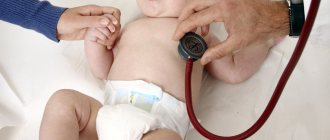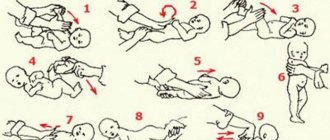WHAT IS PATRONAGE?
Child patronage - examination of a newborn at home. On the day of discharge from the maternity hospital or the next (this information is transmitted to the clinic by the hospital), a doctor and a nurse come to see the mother and baby. Advice: tell the maternity hospital not the address of registration, but the address of actual residence after childbirth, this is where specialists from the clinic will come. Medical staff comes to all families, regardless of registration, availability of insurance, or even citizenship of the Russian Federation. From the birth of the baby until the first month of life, specialists come home every week. Then, starting from the first month, mother and baby visit the clinic on their own. At the visit, the doctor studies the exchange card, collects a detailed history of pregnancy and childbirth, and examines the baby.
WE RECEIVE A POLICY
Every citizen of Russia must have a compulsory health insurance policy (CHI). During the first six months of the baby’s life, you need to contact any insurance company (of your choice) with the passport of one of the parents. Each medical institution has information about insurance companies, sometimes there are even consultants who can guide you. After your visit to the company, you will be given a temporary policy, under which you can also be treated at the clinic for free.
If you have not received a compulsory medical insurance policy during the first six months of your child’s life, you may be denied further services at a government institution.
DO I NEED AN APPOINTMENT?
As a rule, every clinic has a so-called infant day. This is a day (for example, Tuesday) during which all doctors of a medical institution work only with children under one year old. There is no need to queue up for an appointment on infant day using an electronic appointment - specialists accept patients on a first-come, first-served basis. Some doctors try to admit newborns earlier than other infants, but this is at the discretion of the specialist.
More on the topic: What to do with a 5-year-old child at home for his benefit?
TIME OF VISIT
It is better to visit the pediatrician in the morning. The doctor will give a referral to other specialists who can be visited on the same day. Adapt to your child's routine - let your baby get a good night's sleep.
You should not take your baby hungry - he will cry and will not allow the doctor to examine him. But there is no need to feed the baby immediately before visiting the doctor - the baby will simply spit up the milk.
Feed your baby in the morning at a convenient time (for example, at 8-9 o'clock). Then carefully dress him so that he does not spit up, and you can go to the clinic. About an hour will pass from the last meal to the visit to the doctor - this time is optimal so that the baby does not burp at the appointment, but also does not remain hungry. It is better if the baby is asleep during the pediatrician’s appointment, then the doctor will be able to examine him calmly.
Do not overload the baby - if possible, postpone visiting some specialists until the next day of pregnancy. First of all, pay attention to those doctors who do not have an appointment. Then it will be easier to schedule a visit using an electronic appointment. In addition, plan a visit to the neurologist at the beginning of the day - if the baby gets tired and starts to be capricious, the doctor may make an incorrect diagnosis.
Why does a pregnant woman need a pediatrician?
You can often find messages like this on forums: “Girls! I'm now in my 19th week. The consultation told me to register with the children's clinic. The exchange actually has a section about monitoring a pregnant woman by a pediatrician before birth. But for some reason I don’t even want to go to the nursery. Why is this in principle? As I understand it, the pediatrician will not make any new diagnoses or give any prescriptions. Just more paperwork and ticks on the reporting line.”
Let's figure out why a pregnant woman needs a pediatrician? And pediatrician, pediatric gastroenterologist Evgenia Vladimirovna Shriner will help us with this.
Really, why?
This wonderful tradition was founded back in Soviet times. All women registered as pregnant were referred to a pediatrician. The gynecologist gives the pediatrician a complete description of the course of pregnancy. This is necessary so that your baby’s future doctor can form the most complete picture possible about him: what is his heredity, what can be expected in the first days and months after birth, how to prevent this? Believe me, this is invaluable support and help for a young mother, who will not be scared if something goes wrong with the child in the first days of life: he does not latch on to the breast or has dark stools. And why? Because at appointments with the pediatrician, the doctor will give the expectant mother important recommendations that will concern her baby specifically.
If there is a gynecologist, why a pediatrician?
The difference is colossal: when a pregnant woman goes to a gynecologist, he sees her as a woman carrying a new organism. What does a pediatrician do? He monitors the intrauterine development of her baby. At the first appointment, the pediatrician will take the most complete history of the baby’s parents and their immediate family. If the child is not the first, the doctor will make notes about the health characteristics of previous children. All information about the presence of chronic diseases, allergic reactions and various pathologies of organs and systems in the body is analyzed by a doctor. The main task of the pediatrician at this stage is to identify the baby’s inherited genetic predispositions to diseases of the cardiovascular, respiratory, urinary and other vital systems. For example, if a mother is allergic, then the pediatrician will now give her recommendations on limiting those foods that contain allergens and foods that may be sensitizers for the child.
Taking into account the information received, the pediatrician classifies the child into a certain risk group for diseases, which allows him to immediately prescribe the necessary tests, examinations and give him a referral to the necessary specialists, as well as draw up an individual calendar of preventive vaccinations.
Let's go to the reception
Mom will need to collect all the results of the gynecologist’s examinations. Be sure to talk with your parents - mom, dad, in-laws about what diseases they, grandparents had. Take the first child's medical card. That is, prepare as much as possible to help the doctor better understand the situation and help you more effectively.
When should I go to the pediatrician?
Typically, a visit to the pediatrician is scheduled at 30 weeks. Why is this being done? If the pediatrician finds something in the family history, he will refer you to a geneticist. If the pregnancy is multiple or is not going very well, then it is advisable to come at 24-25 weeks to correct the unpleasant aspects.
And I know everything myself
You need to go to the pediatrician, even if you are not a mother for the first time and it seems to you that you know everything. Yes, you are a more experienced mother and you certainly won’t panic if your child has hiccups or bowel movements. But perhaps you had some problems with your first child that you experienced, and you think that this will not happen to you the second time. It’s better to play it safe and consult with a specialist, he will certainly correct this situation. The pediatrician will give specific, practical advice to mitigate the possible threat to the child.
The pediatrician will ask: “How is your pregnancy going?” - “And I had such and such.” - “Let’s do this or drink this.” In such a complex process, everything is individual. It is impossible to give recommendations that will suit everyone. Of course, mom can come out after the visit and say that she didn’t hear anything new for herself. Well, thank God that the pediatrician didn’t find anything to complain about. And if the doctor is worried about something, then, naturally, he will give valuable recommendations, and then the mother will not have regrets that, for example, no one told her to take calcium so that the child’s teeth would not fall out before the due date .
And a little more about the important
It is also necessary to see a pediatrician during pregnancy to create a diet for a nursing mother. The doctor will tell you how to eat properly so as not to provoke allergic reactions, disorders, or bloating in your child. Your pediatrician will definitely talk to you about breastfeeding and its benefits for both mother and baby.
Everyone knows it's good. But sometimes the mother knows everything, understands everything, but decides for herself that she will feed with formula. As a doctor, I will refer to my personal experience - it is in personal conversations that such convinced mothers change their minds. I am glad that such conversations help them realize this, that more and more babies are now breastfed.
The pediatrician will definitely tell you how to properly prepare the breasts and care for them in the future during lactation, and prevent the formation of mastitis. How to pump correctly, how to put a baby to the breast...
Thus, after a visit to the pediatrician, the mother will receive information about prenatal prevention: medical, psychological and pedagogical elements of accompanying the child (the so-called intrauterine education of the child). And most importantly, when a child is born, a pediatrician who observed him before birth and knows well enough all the nuances of the health of both mother and child, if problems arise, can help faster and more effectively than the doctor who sees the mother and her child for the first time and only It is necessary to understand the causes of health problems.
Don't put off visiting your unborn baby's doctor!
DO YOU NEED ADDITIONAL PROTECTION?
You should not smear your child’s nose with special ointments that protect against infection, because sick children do not visit the clinic on baby’s day. In addition, some drugs are not approved for use in children under one year of age. Even if a mother and a sick child come for an appointment, at the entrance they will be directed to another part of the clinic. In addition, if the clinic has a CDC (consultative and diagnostic center), you should not walk with the baby around the medical facility - there is a high probability of meeting carriers of the infection.
More on the topic: YOGA FOR CERVICAL OSTEOCHONDROSIS
WHAT TO BRING WITH YOU
At the clinic, during your first visit to the doctor, you will need the following things:
- Passport;
- temporary or permanent policy;
- card (usually it is already in the doctor’s office);
- disposable or reusable diaper (2-3 pieces);
- diaper (3-4 pieces);
- bottle of water (50 g);
- pacifier;
- a set of replaceable underwear (romper, bodysuit);
- dry formula, a bottle of warm water, a thermos - if the baby is bottle-fed.
What to take
Before going to the clinic, put in your bag:
- Documentation . For your first visit to the clinic, you will need your documents: passport and coupon No. 3-1 birth certificate. A package of children's documents is a child's birth certificate, a compulsory health insurance policy, a compulsory pension insurance insurance card (SNILS), a child's medical card (if you have one), a certificate of preventive vaccinations, examination and test results ( if they are were carried out ). To prevent documents from getting wrinkled or dirty, purchase a plastic envelope folder with a zipper or a button at the stationery store;
- Diapers . You will need 2 of them for the pediatrician, and one for other doctors. But it’s better to take another spare one: children sometimes pee directly on them (what if this happens to you). It is best to take from flannel. The chintz is too thin, and the knitwear curls at the edges. The optimal size is 80x80 (more or less by 10 cm). These diapers fit perfectly on the changing table and don’t take up much space in your bag.
- Toys/rattle . Take new ones or old ones that the child has already forgotten about. It is enough to hide 2-3 pieces a couple of days before your visit to the doctor. They should be easy to wash, because in the clinic you may drop them on the floor more than once. Toys should also be interesting so that the baby does not get bored with them while waiting in line.
- Spare diapers . Take a couple of pieces (things happen).
- Wet wipes . Comments will be unnecessary.
- Food and water . If you are breastfeeding, then your clothes should be comfortable for feeding (you can feed your baby in the room of a healthy child). For an artificial child, take a mixture, and if the child is older, then you can take food that you can eat without getting too dirty (banana, cookies, puree with a dispenser).
- Spare clothes . The diaper sometimes leaks, children spit up and get dirty when they eat. Therefore, spare clothes can be very useful.
- Shoe covers . They are usually given free of charge at the entrance. But what if your clinic doesn’t have shoe covers?
- Questions written in a notebook . Write down everything you want to ask your doctor in advance. Don’t even try to remember: as soon as you step through the threshold of the office, you will immediately forget everything.
- Notepad and pen. They are needed to record important points (the child’s height and weight, doctor’s recommendations, time of the next appointment, etc.).
If your baby is sucking on a pacifier, fasten it to your clothes using a special chain (so it doesn’t fall) and take a couple of clean ones in reserve.
Watch the video: List of necessary things to take with you to an appointment with a pediatrician
WHERE TO LEAVE THINGS?
Strollers Near any clinic there is a special area for strollers. It is located right on the street at the entrance. Please secure your vehicle as strollers are sometimes stolen.
Things Don't leave things in the stroller! You need to take them with you. Sometimes it seems that mom needs too many things - in fact, everything fits in the stroller bag.
The outer clothing of mother and child must be put in the cloakroom - there is always a changing table next to the changing room, where it is convenient to undress the baby.
What should I take with me to my appointment at the clinic?
So, it's time to visit the clinic for the first time. The baby is already a month old, and this is a whole event for the whole family. Infants are usually admitted on separate days to minimize contact with other children. We find out the reception hours, order a ticket and begin preparations.
So, what should you take to the clinic with your newborn?
- A bottle of warmed breast milk or formula, depending on how the baby is fed. If natural feeding is practiced and there is a place for feeding in the clinic, it is quite possible to do without a bottle.
- Change diapers so you can quickly change your baby's clothes. Even if an “accident” does not happen, it will still be useful to change the baby’s clothes after the examination.
- Hot Wind wet wipes are an irreplaceable thing; you should always have them with you both in the clinic and while out for a walk. We recommend taking a large pack, as there may not be enough napkins in small packs.
- A disposable or regular diaper on which the baby can be placed when changing clothes or during an appointment at the doctor's office.
- Pacifier on a cord. If the child is used to sucking it and so calming down, it is highly not recommended to forget this important item. The cord is necessary because otherwise the pacifier will almost certainly fall to the floor sooner or later. Washing it in the public toilet of the clinic will be problematic.
- A handkerchief is also a useful item on the list. Especially relevant for little fans of blowing bubbles.
- A favorite rattle will help distract the child's attention.
The first trip to the clinic is an important “going out into the world”, which requires preparation. To make both mother and baby comfortable, it is better to take everything you need with you. Most often, babies aged one to two months mostly sleep. If the child is active, you can’t do without a couple of toys.
In addition to the list of necessary items, it is important to take care of clothing. If breastfeeding is expected, the mother’s clothing should allow this to be done easily. You can also take a diaper with you, in case you can’t hide from prying eyes. It is important to dress your child so that he does not get too hot in the room. But clothes that are too light are not suitable for a baby.
As a conclusion, we can say that common sense is important when it comes to going to the doctor. You should not take with you absolutely everything that may be useful. Only the most necessary things, because going to the clinic with a baby, as a rule, does not take too much time.
27.09.2017
- Share:
WHERE TO FEED YOUR BABY
If the baby is breastfed, the mother can feed a healthy baby in the room or in the hall in front of her. If your child is bottle-fed, you should take formula with you. The following options are possible:
- Dilute the mixture in warm water at home and take a bottle with you in a thermal bag (the mixture can be stored for 2-3 hours at a temperature of 36.6-37.0 °C);
- Take warm water in a thermos and the dry mixture separately, mix the ingredients at the clinic. This option is less convenient because it takes more time;
- Not all thermoses maintain temperature for 2-3 hours. If you encounter such a problem, instead of a thermos, you can wrap a bottle of water in foil, then in paper and in multi-layer woolen clothing.
More on the topic: SWAMP CENTURE - medicinal properties. Sabelnik is used to treat many diseases
Going to the clinic with a newborn: what to take with you?
It is better to start getting ready for the clinic in the evening, when the baby has already been put to bed. Prepare a bag that is lightweight and spacious, with several external pockets with Velcro or zippers. Pockets and compartments inside will also come in handy.
Of course, it is better to “take” a relative to a children’s clinic - a husband or grandmother or grandfather. A loved one will be very useful as an assistant: he will be able to remind you what needs to be taken, take a turn, or distract a crying baby. But if there is no such volunteer, it’s okay. Any mother can go to the clinic on her own with her baby.
The main thing is to think carefully about what to take with you, so as not to take anything unnecessary and not forget what you need. Remember, a balanced mother is a certain guarantee of the child’s calm behavior during medical procedures. So, we’re packing our bags for a visit to the clinic with our one-year-old baby.
Step 1. What documents to take to the clinic
Documents are the most important thing when visiting a clinic. Therefore, we put the child’s medical insurance policy and birth certificate (it will only be needed at the first visit), placed in a transparent file, in the outer pocket of the bag (if it is roomy enough) or inside, in a zippered compartment, away from anything that could splash it. Take your passport too, just in case.
Step 2. Don't forget diapers and nappies to the clinic!
In the main compartment of the bag we have the necessary personal hygiene items. In a separate bag we place two or three diapers and a couple of diapers. Diapers will be needed at the pediatrician's appointment when examining the baby. It’s also clear with diapers: for a baby, going to the doctor is stressful, so “baby surprises” of various sizes are inevitable. Wet wipes are also absolutely essential.
Step 3. A change of clothes for the clinic - just in case...
A set of changeable clothes - rompers and a blouse or a comfortable bodysuit - will also come in handy. After all, the baby can burp and stain his clothes. If your baby uses a pacifier, don't forget it. She will calm him down while he waits.
Step 4. What to do with a child at the clinic?
You will need two or three toys to keep your baby busy in line. Just don’t give them to him right away, so that he won’t be left without entertainment ahead of time. In addition, a toy can be a distraction if the child is naughty during the reception. By the way, it’s worth taking some new book with you - with soft textured pages, rubber loops and various funny “rustles”.
Step 5. Where to keep important things during a visit to the clinic?
It is better to put your apartment keys, car keys, and wallet in a separate inner pocket so that you always know where they are, thereby saving yourself the hassle of searching. After all, if, say, the keys end up at the very bottom of the bag under your things, you are unlikely to be happy about it. Take a mirror - it can distract your baby from crying, and you may also need to evaluate your appearance.
Step 6. Bottle of water or milk
The bottle of mixture or tea should be placed last before leaving the house, as it must be fresh. To keep the drink warm longer, it is better to place the bottle in a special compact container.
MEDICAL EXAMINATION
- At the clinic, the pediatrician asks the mother questions and examines the baby.
- Undresses the newborn, listens to the heart and lungs. This is possible even if the baby is crying.
- Measures head and chest circumference, height, and weighs the baby.
- Palpates the abdomen (it may be swollen).
- Listens to heart murmurs.
- Spreads the hip joints.
- He looks to see if the baby fixes his gaze and reacts to sound.
- Assess the condition of the skin and oral mucosa (whether there is a white coating on the tongue).
- Monitors neurological symptoms (or their dynamics, if something is discovered during patronage) - increased or decreased muscle tone, shaking hands or chin in a calm state, posture during sleep.
News MirTesen
How the appointment will take place and how to behave in the pediatrician’s office
At the pediatrician's appointment, the child will be asked to undress, weighed, and their height, as well as the circumference of the head and chest (as they inhale and exhale), will be measured.
They will also check how the fontanel is healing and the mark from the BCG vaccination, which is usually done in the maternity hospital, check the symmetry of the folds (you can remind the pediatrician about this), listen to the heart and lungs, look at the oral cavity and ask the mother about the baby’s life, for example, how long minutes a day in the fresh air, how often bathing takes place, etc. You can and should ask the pediatrician any questions, because a calm mother means a calm child. Keep a separate notebook just for this. As a rule, in the first month a new mother has a lot of questions, so write them all down in a notebook so as not to forget. Write even the most obvious questions, for example, why a newborn’s stool has white spots. This is because mom needs to get an expert opinion and calm down.











